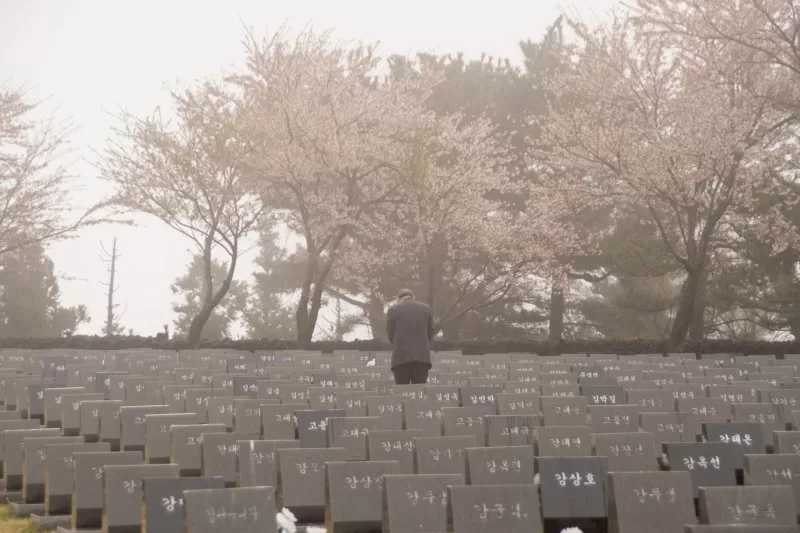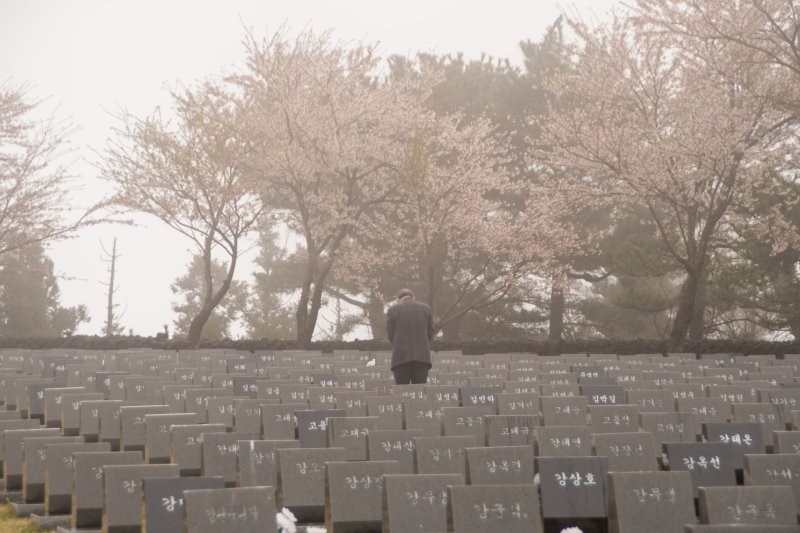1 of 4 | A man pays his respects during the 76th anniversary of the Jeju 4.3 memorial ceremony at the Jeju 4.3 Peace Park in Jeju City, South Korea, on April 3, 2024. A moment aimed at securing an apology from the United States over its involvement in the massacre was discussed Wednesday during the Jeju Forum for Peace and Prosperity. Photo by Darryl Coote/UPI
JEJU ISLAND, South Korea, May 29 (UPI) — If South Korea is to achieve an apology from the U.S. government for an early Cold War-era atrocity committed under Washington’s watch, it needs to launch an extensive campaign, according to a former high-ranking U.S. State Department official who said he will aid in the effort.
Though there is no proof of direct U.S. involvement in a massacre of upwards of 30,000 people on South Korea’s southern resort island of Jeju between 1947 and 1954, advocates and academics say the United States is culpable as it was aware of the killings by the newly founded South Korean government and that it even encouraged them in an effort to snuff out a communist uprising.
Over the last few years, there has been a growing movement on Jeju Island, located about 60 miles south of the South Korean mainland, to have the U.S. government apologize for its responsibility for the Jeju Massacre, known in Korean as Jeju 4.3, or April 3, the day of the communist revolt in 1948.
Speaking during a session Wednesday dedicated to the massacre on the island at the Jeju Forum for Peace and Prosperity, which runs through Friday and the International Convention Center Jeju, Robert Gallucci, a former U.S. ambassador-at-large and special envoy for the U.S. Department of State, said to achieve the apology, Jeju not only needs but deserves a multi-pronged campaign that includes a U.S.-based professional public relations firm to lobby Washington for them.
“If this is to be done, it is my view that it really requires a campaign, a strategy. It requires the American embassy here to be fully onboard. It requires your embassy in Washington to be fully onboard. It requires for this to become an issue in the American press,” he said.
“It requires it be brought to the right places in the Department of State, the White House and the U.S. Congress. It requires that any doubters about U.S. responsibility be addressed.”
For decades, the history of the Jeju Massacre was buried by a succession of dictator governments in South Korea, and only following years of activism and the democratization of the country did Seoul apologize to the Island for the state violence in 2003.
A government-led truth and reconciliation movement birthed from the activism has achieved many victories in recent years, including the retrials of those wrongly convicted during the massacre and compensation, with the U.S. apology now seen as a next step in the process.
Heo Ho Joon, a senior reporter with The Hankyoreh and author of American Involvement in the Jeju April 3 Incident, said during the session that one of the unfinished tasks is to clarify the United States’ role in the massacre.
He said Washington has never made a direct reference to or acknowledgment of its involvement in the massacre, suggesting its silence on the issue represents a fissure in the otherwise solid U.S.-South Korean relationship.
“The United States must confront its past in Jeju Island and through this, we must work together to build a better future,” he said.
“If South Korea and the United States bravely confront Jeju’s past, this will create a resonance for the world, and the trust between the two countries will grow deeper and stronger.”
The relationship between South Korea and the United States has been strengthened in recent years, especially militarily under growing tensions with North Korea.
Gallucci, a distinguished professor at Georgetown University’s Walsh School of Foreign Service, said if the massacre was “in the air” then South Korea could address the issue with the United States when national security issues arise.
He said it would be an “enormously appropriate opportunity to address it” and if he were working for that hypothetical consulting firm “I’d say, you wouldn’t let an opportunity like that go by without saying — not only let’s mention April 3, let’s resolve that issue.”
He also suggested that a segment of the U.S. public may be open to an apology for not preventing the massacre, pointing to ongoing efforts in the United States in recent years to remove statues of slaveholders, even if they were founding fathers, and to rename schools christened after Confederate soldiers.
He said the United States was slowly and unevenly trying to take responsibility for its past.
“We’ve come to the point, I think, where a lot of people are not satisfied with looking away,” he said. “And all I would say to you is that I would like to be apart of the effort to make sure Americans don’t look away from April 3.”

